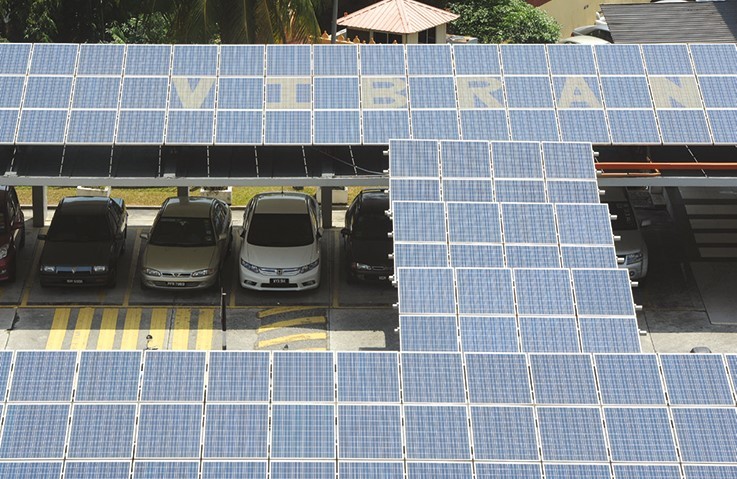
The green agenda outlined in the 12th Malaysia Plan (12MP) bodes well for Malaysia’s energy industry as it moves in line with global transition towards clean and sustainable practices.
AmBank Research, in a report in September, said policies will be streamlined for the transition and these would include prioritising domestically-produced petrol and diesel, scaling up biofuel usage, developing a natural gas roadmap, promoting high-value investments in petrochemical industry, and encouraging collaboration and strategic partnerships among small and medium oil and gas (O&G) operators to undertake complex projects.
“In our view, these policies support our positive outlook for the sector as the low current exploration and development activities by international oil companies are likely to lead to a global supply shortfall over the next five to 10 years unless capital expenditure rollouts accelerate substantively over the next two to three years,” it said.
Additionally, rising demand for natural gas, which is a transition fuel, and petrochemicals in tandem with a global post-pandemic economic recovery and expanding population will continue to underpin earnings momentum for the sector.
MALAYSIA’S FIRST GREEN PLAN
Asia School of Business assistant professor of business and society Dr Renato Lima de Oliveira said the 12MP was the first “green” Malaysia plan, in part because of the one-year gap between when it was originally scheduled to be tabled back in August 2020.
Speaking to Bernama, de Oliveira said the green growth agenda is much stronger now and the new five-year plan captured that sentiment.
“In the meantime, the European Union has pushed an ambitious carbon reduction strategy, making its stand with border-adjusted carbon taxes for the future; Environmental, Social, and Governance (ESG) funds have grown tremendously; and several companies announced net zero targets by 2050, including Petroliam Nasional Bhd (Petronas) which did in November last year.
“Carbon-intensive long duration assets like new coal power plants are a liability in today’s world. They should be avoided, both from an environmental standpoint but also because they are losing competitiveness. So this readjustment of priorities should be very welcomed,” he pointed out.
On paper, the 12MP, tabled by Prime Minister Datuk Seri Ismail Sabri Yaakob and passed in Parliament on Oct 7, is a bold statement with climate change mitigation featuring prominently.
The country aims to be carbon neutral by 2050 at the earliest and overhaul its energy, transportation as well as land use sectors.
CARBON TAX
Under the 12MP, the government announced that carbon pricing instruments will be introduced in the form of carbon tax and a domestic emissions trading scheme (DETS).
These tools essentially set a value or price on greenhouse gas (GHG) emissions to be paid by the parties responsible, and effectively make it a necessity for businesses to reduce emissions to remain competitive and sustainable.
Details of other measures for carbon reduction will be announced once the low-carbon long-term development strategy study is finalised by the end of 2022.
According to de Oliveira, a carbon tax is technically the best solution to encourage less carbon intensive investments.
“However, it has shown to be politically hard to implement. Instead, governments frequently resort to other ways to encourage renewable sources of energy, such as tax breaks and large-scale solar auctions, or penalise carbon-heavy production via direct emission regulations,” he added.
For a carbon tax to work, it will be key to gather the necessary political support for implementation.
de Oliveira pointed out that a very high carbon price at the beginning will create political backlash while a very low price will not have an impact.
“It may also be important to make this revenue neutral. The 12MP announced a feasibility study on carbon pricing but (it’s) not a firm commitment yet,” he added.
Meanwhile, Putra Business School Associate Professor and manager of business development Dr Ahmed Razman Abdul Latiff said the introduction of carbon tax can be considered to support the 17 Sustainable Development Goals which is championed by the government under Shared Prosperity Vision 2030.
“Of course, the introduction of such a tax can only be done with proper discourse between the relevant stakeholders and awareness and campaign on it must be done,” he said.
MANUFACTURING OF ELECTRIC VEHICLES
Under the 12MP, the government will also give priority to the development of an energy-efficient vehicle (EEV) manufacturing industry to support environmentally friendly mobility initiatives.
The government is also studying incentive packages to encourage electric vehicle (EV) ownership among Malaysians, involving road tax exemptions as well as incentives via income tax returns and income tax relief for the installation of EV facilities.
de Oliveira said the development of the EEV manufacturing industry would likely translate to less expensive green cars in terms of scale and network effects.
“If more electric vehicles are manufactured in Malaysia, unit costs will likely go down. This will also create an incentive to invest in the accompanying infrastructure, such as EV chargers.
“With more chargers across the country, drivers will worry less about range anxiety, the risk that they will run out of energy when hitting the road for a longer trip. Together, these can help put the EV industry in a virtuous cycle.
Source: https://themalaysianreserve.com/2021/12/12/green-agenda-bodes-well-with-malaysias-energy-industry/

